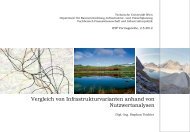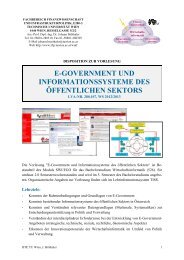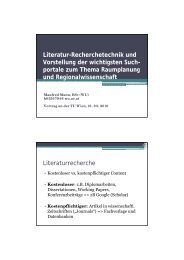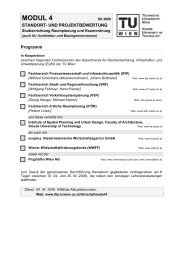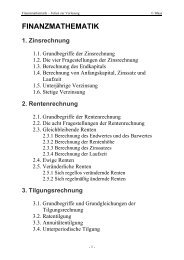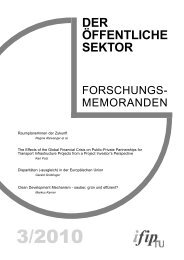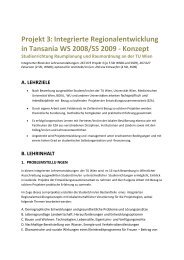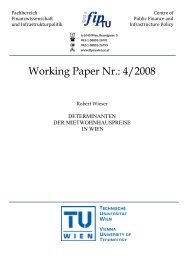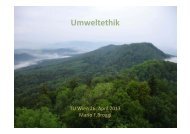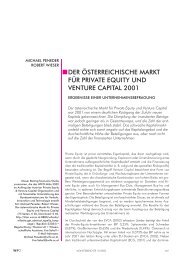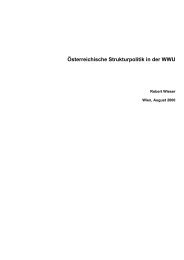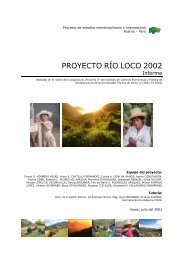Download as a PDF - CiteSeerX
Download as a PDF - CiteSeerX
Download as a PDF - CiteSeerX
You also want an ePaper? Increase the reach of your titles
YUMPU automatically turns print PDFs into web optimized ePapers that Google loves.
Regional TV and local radio can be used to highlight local issues that interest or<br />
affect farmers.<br />
The Farm Adviser<br />
The value of the adviser in face-to-face communication h<strong>as</strong> been noted in a number<br />
of studies of information provision in agriculture (Jones et al., 1987; Cox et al.,<br />
1990; Fearne 1990; Angell et al., 1997). Farm visits and face-to-face advice w<strong>as</strong><br />
the preferred method of advice delivery stressed by farmers in farmer panels and<br />
agency interviewees, in an appraisal of conservation advice undertaken for English<br />
Nature (Winter et al., 2000). Farmers emph<strong>as</strong>ise the need for a trusted individual<br />
to act <strong>as</strong> a mentor or interpreter and, for the most part, farmers put greatest value<br />
on information that h<strong>as</strong> been interpreted and given in a specific form. Thus, Winter<br />
et al. (2000) found that farmers prefer face-to-face contact with someone who h<strong>as</strong><br />
interpreted the information within the context of their own business, reflecting the<br />
farmer’s lack of time, the incre<strong>as</strong>ingly technical and legislative nature of the required<br />
information and the perceived need for location specific advice. Where organisations<br />
only provide written material, they recognise that its value is greatest if it is read by<br />
professionals who then go on to provide advice to farmers (Angell et al., 1997). The<br />
success of agri-environment schemes, such <strong>as</strong> ESAs and CSS, h<strong>as</strong> been shown to<br />
be critically dependent on the work of project officers or other advisers promoting<br />
the scheme (Cooper, 1999). The crucial role of advisers/consultants in supporting<br />
farmers in their use of complex nutrient management systems w<strong>as</strong> also noted in<br />
a study of European Input-Output accounting systems (Goodl<strong>as</strong>s et al., 2003).<br />
Morris et al. (2000), examining the uptake of arable options in the CSS, also found<br />
that face-to-face interaction with advisors on the farm w<strong>as</strong> an important channel<br />
of communication. The research showed that, although the m<strong>as</strong>s media appeared<br />
to have been the chief vehicle through which farmers became aware of the CSS,<br />
personal communication with advisors played a significant role in persuading farmers<br />
to take up the schemes that they had heard of through the farming press.<br />
In the context of environmental pollution, the FACTS scheme of adviser registration<br />
and continuing professional development (CPD) h<strong>as</strong> an important role to play in<br />
ensuring that advisers are up to date and well informed about the risks <strong>as</strong>sociated<br />
with poor fertiliser and manure management practices.<br />
Voluntary Versus Compulsory Me<strong>as</strong>ures<br />
Best practice me<strong>as</strong>ures may be voluntary, <strong>as</strong> for example in the Codes of Good<br />
Agricultural Practice. The adoption of such me<strong>as</strong>ures is likely to depend on how e<strong>as</strong>y<br />
they are for the farmer to implement. Financial penalties are a significant disincentive<br />
to uptake whilst marketing advantages of compliance such <strong>as</strong> in some Quality<br />
Assurance schemes incre<strong>as</strong>e uptake (Goodl<strong>as</strong>s et al., 2003). Overall the methods<br />
used to encourage uptake of best practice are often a combination of the ‘carrot and<br />
stick’ approach, where the ‘carrot’ usually takes the form of government support,<br />
and the ‘stick’ is regulation and non-compliance penalties.<br />
In the absence of the legislative ‘stick’, a Danish study on what influences farmers<br />
to change their practices suggests that a combination of farmer study groups with<br />
<strong>as</strong>sociated one-to-one advice is very effective (Halberg et al., 2005). However, this<br />
is expensive in terms of advisory input time and only reaches a small number of<br />
181





